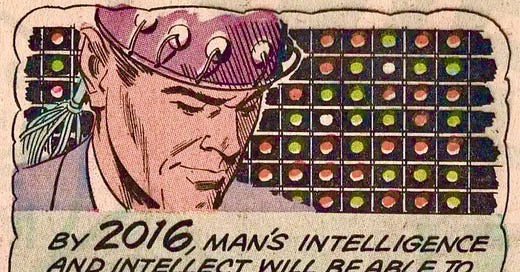How I learned to stop worrying and love the AI apocalypse
Will AI destroy the world? That's the wrong question.
“I predict the Internet will soon go spectacularly supernova and in 1996 catastrophically collapse.” That’s what Robert Metcalfe, the inventor of Ethernet, said in 1995.
Doom-and-gloom predictions rarely happen. And predicting the future is almost impossible.
Still, some AI experts say that, in the future, artificial general intelligence (AGI), will achieve a singularity of eclipsing human intelligence, and will usher in a catastrophe of some kind or another. Other equally qualified experts say the fears are overblown or even ridiculous.
AI acting against humanity seems unlikely. Humans using AI to act against humanity seems like a much greater risk.
And if we’re talking about probabilities, it seems way more likely that AI will save us than destroy us.
Still, who knows?
Still, it’s 2023, and we’re all being forced to suddenly confront the reality of AI. That forcing came about from San Francisco-based OpenAI. While large language models (LLMs) and generative AI technologies had been slowly and methodically advancing in labs for many years, OpenAI’s creation and public releases of ChatGPT in November and the beta of DALL-E 2 one year ago shocked the public with what this kind of AI is capable of.
Companies that had been working behind the scenes on their own LLM chatbots scrambled to surface public chatbots, including Microsoft’s Bing ChatGPT, Google’s LaMDA-based Bard and Alibaba’s Tongyi Qianwen.
Far more impactfully, Silicon valley and independent developers worldwide rushed to use the APIs to create new apps, and now tens of thousands have been rushed to market.
Tech founder, angel investor, product designer and Product Hunt super-user, Chris Messina, told me on the This Week in Google podcast that now the overwhelming majority of apps on Product Hunt are now based on AI. Just a year ago, AI-based apps were relatively rare.
When the PC revolution took off in the 90s, it was applications that changed the world and the PCs merely enabled us all to use them.
When Apple mainstreamed touch-interface smartphones in 2007, it was apps that changed the world and the smartphones merely enabled us all to use them.
And, likewise, as LLMs go mainstream, it’s the apps that will change the world. Which brings me to the point of this entire missive.
How to think about the AI revolution
AI apps and products that leverage AI are here for all to use, and different people will use them in different ways with different outcomes.
Passively. For starters, everyone who uses a phone, tablet or PC will use AI — in fact, is already using AI — because it’s increasingly built into everything we use. For example, Apple’s Airpod line of earbuds uses AI extensively for personalized volume, conversation awareness, adaptive audio, personalized spatial audio and for accessing and using Siri.
To offload. The first impulse for many people trying ChatGPT and LLM-based apps is to just let the AI do work. Students are letting ChatGPT write their school essays and educators are freaking out about it, for example. People are using it to craft emails, speeches, birthday card notes and other writing.
To amplify. The third way is to essentially use AI as prosthetic knowledge and brainpower, to make one’s personal self more productive, effective and successful.
AI is analogous to a moving sidewalk at the airport. Some people use it to do their walking for them. They get on and stand there, arriving at the same place in the same time, but with less effort. Others get on and walk, arriving at the same place in less time. Same tool; different motives.
I would recommend that all of us use AI for all three purposes. And in fact I would suggest that using AI is something of an artform to be mastered for maximum personal benefit.
Mike’s List of Shameless Self-Promotions
How we know that Apple’s Vision Pro means business
Spot fake ransomware attacks without wasting time and money
Read ELGAN.COM for more!
Mike’s Location: Silicon Valley, California
(Why Mike is always traveling.)







